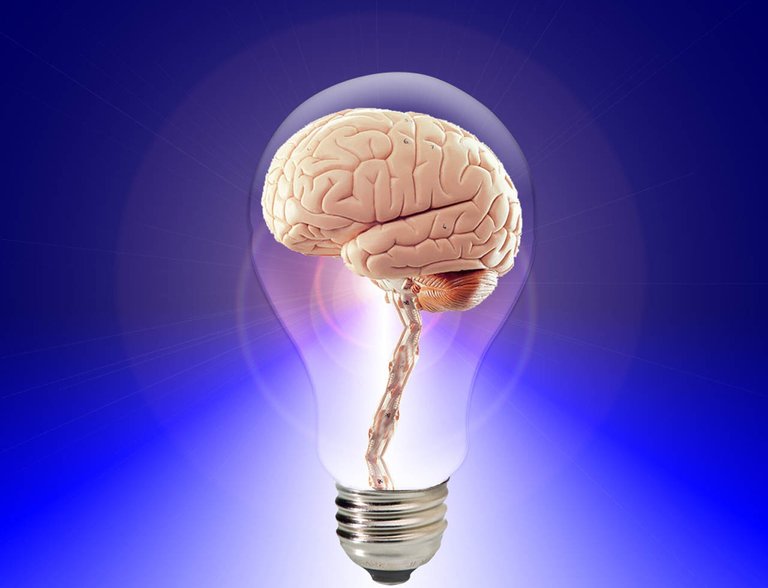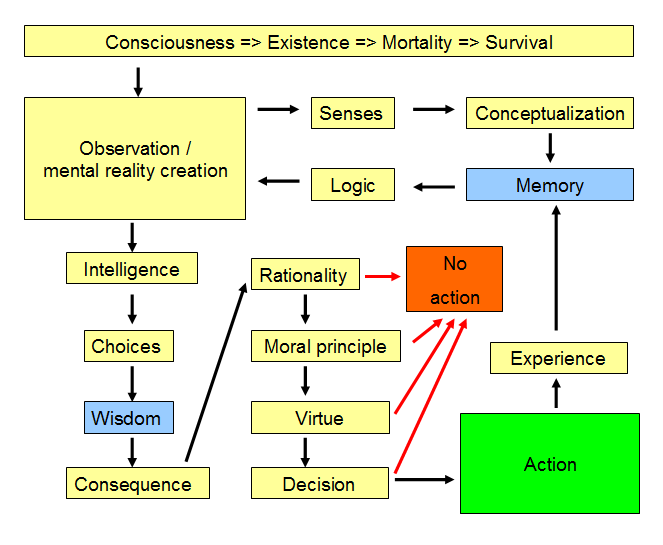Everything that you experience is all going on in your mind - but this does not mean that ONLY your mind exists (Descartes). It means, that both the representation of reality, your illusions and your opinions all exist in your mind. The extremely important thing to understand is that your mental representation of reality has to undergo some scrutiny before you should accept it as correct. This is basically the proces of comparing your mental representation with the data from your senses, to validate if it is true or it is false.

Your actions are based on your ability to represent reality in your mind. The better you are at representing reality correctly, the better decisions you will potentially make. If you believe that ferries will dump food in your lap, your actions will reflect that and since it is a completely false representation of reality, it will make you unhappy and ultimately kill you.
The problem with morality is that it is completely optional. It is a mental exercise, it is not guided by any natural forces like gravity or such. There is nothing to stop you from acting immoral - there is no force that you can describe scientifically, that will always steer you in the "correct" direction.
As with the question of free will, in my opinion it cannot be more than indicated by observation, that people act in a way, that is in accordance with a belief in morality. There are the ten commandments for instance. They are of moral nature and they can be seen as an appeal to choose certain actions when certain choices appear. If you are in a position grab someone else´s things, the "commandment" narrows your choice to one possibility so to say - "do not". These appeals can be based on a large number of interests, that are not necessarily based on the growth of happiness of the receiver of the commandment, but often stems an incentive of control from the commander.
It is sort of the holy grail of philosophy, to prove that morality "exists". I think that it is the wrong way to "attack" the problem of morality and my task is to illustrate where morality fits in when you use your brain. From there it may be easier to sort of point at instances in human actions that indicates moral choices.
I have made a diagram to connect all the "dots" so to say and it hopefully gives a good overview for hanging on while i explain my ideas. Now this is a layman philosophers "work" so there may be glaring omissions and faults, that i have not spotted. So if you have any suggestions for improvement and correction, please feel free to comment

Consciousness => Existence => Mortality => Survival
We are apes with a unique expansion pack, that has made us able to be conscious. How to define and describe consciousness i will not endeavor to since i have not come up with a valid explanation and to my knowledge no one else has. Conscience gives us the notion of existence. We are able to recognize three dimensional space and have a notion of time. Time falls out of the the contradiction of being at different points in space at once, and time is notion that comes of movement between points. Through our consciousness of existence, we discover our mortality and from mortality springs immediately the urge to survive. Survival is our primary biological purpose.

Observation (Senses -> conceptualization -> memory -> logic)
When you realize that you want to survive, you have to get resources to keep your organism going. And those resources are not already in your "system" or lying around at your feet - so you have to take some action to get a hold of what you need. Therefore your mind starts to observe your surroundings to make a representation in your head that is useful for exploring the reality out there that your body functions in and where the resources are.
To create that "mental reality", you use your senses to sort of "paint the picture" in your mind. You look, hear, smell, feel and taste .. and likely in that order, since it describes the range of operation from large to small. The structure of the "painting" is concepts. Concepts are ideal representations of the repeatable patterns around you that you recognize from memory (or maybe by creating new if necessary). Logic is the tool by which you decide which concepts are present in your painting. This circular proces runs constantly, except when you sleep.

Intelligence -> Choices -> Wisdom -> Consequences
Now when you have painted a true to reality picture of your "surroundings" you use your intelligence to figure out the possibilities - more specifically, which choices are available. Your wisdom is then your guide to figure out the consequences of each choice. The consequences are sort of the raw data for the final action you take to enhance your chance of survival.
Rationality
Rationality is your judgment (reason) of the potential gain for you from a specific consequence of a choice. You may judge that no gain or insufficient gain is at hand, or too much danger or some other reason, so you will not take any action on or proces it any further.
Moral principle
On the other hand your gain may be sufficient and the next step is to check the consequence up against a (moral) principle (for instance NAP, the Non Aggression Principle), to decide if the consequence has any negative effekt on other human beings. The principle is a "rule" that must be applicable anywhere in the universe, at any time, past present and future and for everyone. If the consequence of acting on a specific choice violates the principle, there should be no action. Moral principles are always in the category of "do not", since it is compatible with the anywhere-anytime-anywho character of the principle.
Virtue
The consequence is then compared against the virtue you want to transmit. Virtue is not necessarily morality, but morality is always virtuous. Virtue is avoiding consequences that reduces your social status, sexual attractiveness etc. If it is not virtuous, there is no action.

Decision
Finally you need to make the decision to take the action or not by comparing with other possible decisions and their possible interference with each other.
Action -> Experience -> Memory
Time to get to action and collect experience to store in your memory for improving future observations.
Thank you for reading :-)
Illustrations from Pixabay
Tusen takk for denne fine artikkelen. Jeg er ny her men følger deg nå. Har besøkt København og @ramta viste meg mange gode steder.
Med vennlig hilsen
Barbro
Thanks for reading, hope it is useful :-)